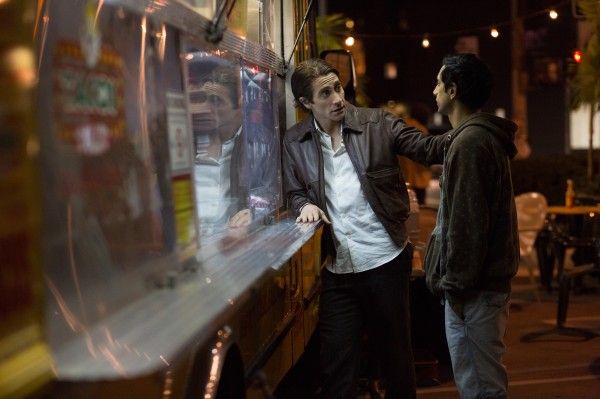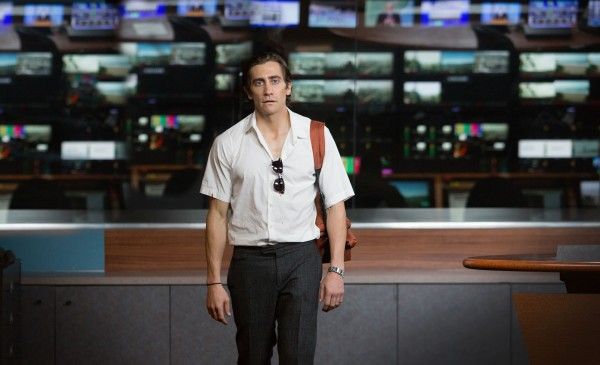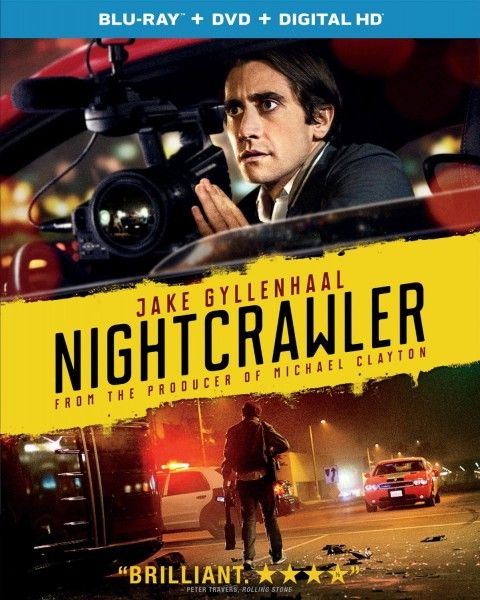Some artists are able to absorb and digest their influences in such a way that you can sense the inspiration without drawing direct correlations. Martin Scorsese’s Taxi Driver was likely an influence on There Will be Blood, yet it’s hard to see a lot of Travis Bickle in Daniel Plainview. But it’s impossible to be well versed in the cinema of the seventies and not see where writer/director Dan Gilroy drew inspiration from in making Nightcrawler. That’s an interesting question: Does being aware of an artist’s touchstones make a work inherently lesser? Is that a fair criticism? Regardless, the film features a tremendous performance by Jake Gyllenhaal, who delivers a career-best work in a film that is a subversive success story about a man whose talents should probably get him arrested.
The film starts with Louis Bloom (Gyllenhaal) on a hustle. He’s stealing wire and manhole covers, and is willing to assault a security guard to get it. Gilroy is smart to show the character’s violent potential from the get-go so you don’t wonder if he will explode, but when he will explode next. One night he sees a car accident on a freeway and meets “Nightcrawler” Joe Loder (Bill Paxton), a cameraman who scouts bad accidents and tragedies that can be filmed and sold to local news stations. Taking this idea to heart, Bloom decides to buy a video camera and a police scanner and get in on the action. His first footage and experiences are not great, but getting close to terrible accidents is his forte. He finds something of a kindred spirit in Nina Romina (Rene Russo), the news director for KTLA, and she’s the one who guides him by noting that the footage she’s most interested in sells paranoia to middle class white people, and that he should avoid shooting footage in poorer neighborhoods.
Bloom does well by this, and he hires an intern, Rick (Riz Ahmed) to help him on his nightly footage quests. Loder tries to take Bloom under his wing, but Louis has grown too big and doesn’t like to work with other people and not be in control, and as his empire grows he also tries to entice Nina into a sexual relationship. The question becomes if Bloom will get so desperate or arrogant he’ll actually commit a crime to get footage.
Jake Gyllenhaal has been through the Hollywood mill, and though he’s been dabbling in studio work for a long time, he’s never found a great role when playing a traditional leading man (his time as the Prince of Persia is best forgotten, and though he’s fine in Zodiac, it’s not his movie). To date, his best work was in films like Brokeback Mountain and Donnie Darko. But now with Nightcrawler, a film where he is in virtually every frame of the movie, he delivers his finest performance as a magnetically sleazy entrepreneur. He spouts internet wisdom, and knows a lot of motivational-type sayings, but he obviously bristles a lot of the people he’s around, so the film never lets you like the character – another reason it’s smart that he’s introduced committing crimes – and Bloom reveals the truth of himself in one awesome sentence: “What if my problem wasn't that I don't understand people, but that I don't like them?”
The film can be seen as an attack, like Network before it, on the crumbling standards of both news and television, that no one’s after good journalism so much as the old cliché “if it bleeds it leads,” but I think the film posits Bloom as a shark that functions as a great capitalist, a man driven to be the best by eliminating competition and ignoring decency to get what he wants. This puts him in the anti-hero cinematic camp of characters like There Will be Blood’s Daniel Plainview and Taxi Driver’s Travis Bickle, but drawing parallels to those characters points out the differences. Plainview is a man who eventually loses his entire soul, but is not a complete villain in his heart, while Bickle is obviously damaged and socially awkward. Lou Bloom may be damaged, but he’s also more in control, he’s more of a sociopath who finally finds the job that allows his “gifts” to come into focus. Bloom doesn’t change, he doesn’t need to, but like those other figures, he is rewarded for all the wrong reasons.
But unfortunately, it’s hard not to note when you see fingerprints of what came before. It’s likely that when writing Memento Christopher Nolan was influenced by Quentin Tarantino’s Pulp Fiction and how that film played with structure, but because Nolan took it to the next level it’s possible to see how one led to the other without connecting the two automatically. Whereas with Nightcrawler, as amazing as it is, it seems a modern redress of familiar conceits. The question is if that’s a negative, and there are probably many audience members who were blown away by this who haven’t what Gilroy is riffing on the film is absolutely well executed, and brilliantly put together (Robert Elswitt’s cinematography is master-class stuff, and he absolutely gets Los Angeles); it’s a great film. Perhaps the problem is that it makes the narrative less thrilling when you have a lead on where it might go. Or perhaps it’s that the anti-hero character has become so popular on cable television, with Vic Mackey, Tony Soprano, Walter White some of the most compelling figures in modern entertainment, that it’s hard to see this as that original, as sui generis. It’s these things that may keep the film from being hard to elevate the film to masterclass status. Regardless, it’s an excellent film.
Universal’s Blu-ray comes with a DVD and digital copy, and the film is presented in widescreen (2.35:1) and in DTS-HD 5.1 Master audio. It’s a direct port, and Elswitt’s cinematography pops on the small screen, while the soundtrack is enveloping. Extras are limited to a commentary by writer/director Dan Gilroy, his brother/the film’s editor John Gilroy, and their brother/the film’s producer Tony Gilroy. Dan has written movies in the past, but for the longest time I thought the film was a product of Tony, who also helmed the execrable The Bourne Legacy and the charming Duplicity. The Gilroys are a talented lot. That’s the meat of the supplements as the only featurette is the short making of “If It Bleeds, It Leads” (5 min.) which gets soundbites from real nightcrawlers along with its stars, and basically spoils the whole movie.






